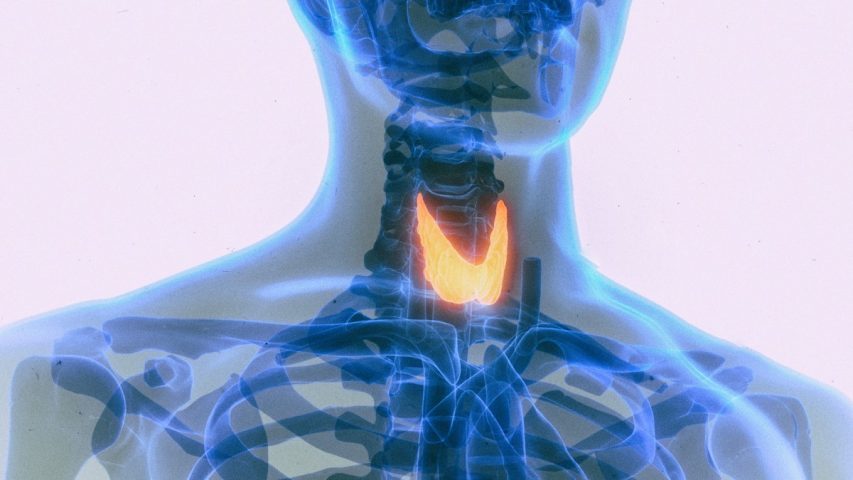- Have any questions? Contact us!
- info@dr-rath-foundation.org

New Report Finds Just 28 Percent Of UK Patient Groups Have Positive View Of Pharma Industry
August 7, 2019
Lower Vitamin D Levels Linked To Parkinson’s Disease Symptoms, Study Suggests
August 8, 2019New Clinical Trial Finds Vitamin D Supplements May Help Alleviate Common Thyroid Disorder

A new clinical trial has found that vitamin D supplements may help alleviate Hashimoto’s disease, a common autoimmune disorder in which the thyroid gland is gradually destroyed. Carried out by researchers in Iran, the study investigated the effect of vitamin D on circulating thyroid antibodies and thyroid hormones. After evaluating the results, the researchers found that patients taking the vitamin D exhibited significantly decreased disease activity.
Part of the endocrine system, the thyroid gland produces hormones that coordinate many of the body’s key functions. Hashimoto’s disease often leads to the gland becoming underactive and not producing enough of these hormones. This can result in symptoms such as fatigue, weight gain, increased sensitivity to cold, joint and muscle pain, constipation, a slowed heart rate, and other problems. Some estimates suggest there may be up to 130 million sufferers of Hashimoto’s disease worldwide.
The Iranian study involved a total of 42 women diagnosed with the disorder. After randomly dividing them into two groups, the researchers gave one group a weekly vitamin D dose of 50,000 IU for a period of three months. The other group was given a weekly placebo pill. At the end of the study the researchers found that patients taking the vitamin D had a significant reduction in their serum levels of anti-thyroperoxidase antibodies, the presence of which are commonly associated with Hashimoto’s disease, and thyroid-stimulating hormone, a hormone produced by the pituitary gland, levels of which are normally raised in the condition.
The researchers concluded that vitamin D supplementation can be helpful for alleviating disease activity in Hashimoto’s disease. They also recommended that further studies should be carried out to determine whether the approach can be introduced into clinical practice.
On the verge of a revolution in healthcare
 With vitamin D deficiency already known to be a frequent finding in Hashimoto’s disease, the outcome of this clinical trial will inevitably arouse widespread interest in patients suffering from the condition. However, it should be noted that the trial is far from being the only study indicating the role of micronutrients in Hashimoto’s disease. In fact, research now shows there are multiple nutritional factors involved in determining the risk of developing the disorder. Deficiencies of minerals such as selenium are known to increase the risk, for example. Researchers therefore suggest that where selenium intake is low, a daily supplement of 50-100 mcg may be an appropriate strategy for prevention.
With vitamin D deficiency already known to be a frequent finding in Hashimoto’s disease, the outcome of this clinical trial will inevitably arouse widespread interest in patients suffering from the condition. However, it should be noted that the trial is far from being the only study indicating the role of micronutrients in Hashimoto’s disease. In fact, research now shows there are multiple nutritional factors involved in determining the risk of developing the disorder. Deficiencies of minerals such as selenium are known to increase the risk, for example. Researchers therefore suggest that where selenium intake is low, a daily supplement of 50-100 mcg may be an appropriate strategy for prevention.
Patients with autoimmune thyroid disease are also known to have a high prevalence of vitamin B12 deficiency. Some researchers suggest that vitamin B12 deficiency occurs in up to 55 percent of patients with these disorders. Replenishing the body’s stores of vitamin B12 can therefore help prevent cognitive impairment and other damaging consequences of deficiency in patients.
But for optimum prevention and control of Hashimoto’s disease, a carefully chosen combination of micronutrients will always offer the best chances of success. This principle is central to Dr. Rath’s groundbreaking Cellular Medicine concept and has brought proven results in every disease area it has thus far been applied to. Notably, therefore, some evidence suggests that coupled with a good diet, combining micronutrients such as vitamin B complex, coenzyme Q10, magnesium, omega-3 fatty acids and others can be helpful in managing the condition.
With the publication of the new Iranian study, Hashimoto’s disease seems poised to join the long list of common diseases for which natural therapies are becoming a viable option for patients. As we stand on the verge of this scientific revolution in healthcare, doctors everywhere would be well-advised to take immediate steps to educate themselves about it. For as is often said, if the doctors of today fail to become the nutritionists of tomorrow, the nutritionists of today will surely become the doctors of tomorrow. Vive la révolution!



